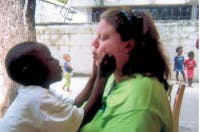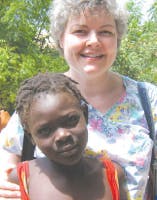Letters to the editor
Readers respond
Lab medicine's hero
I just picked up the November (2008) issue of MLO
and saw the Executive Snapshot of Westgard (“Westgard's trilogy for
analytical QM, page 34). This guy is a Lab Medicine GOD
and should have an entire ISSUE, not just an Executive Snapshot!
—Anne Hendricks-Jones
Lab Support Manager
San Antonio Community Hospital Lab
Upland, CA
Editor's note:MLO is well aware of Jim
Westgard's status! He volunteered to be a “stand-in” for this column,
meaning we could “plug him in” when an industry executive “had to unplug.”
(This is another measure of his stature … that he does not KNOW he is Lab
Medicine GOD!!) He is also aware that we are celebrating MLO's 40th
birthday this year, and he will be featured again in that year-long focus.
Volunteer doc seeking analyzer
I am a primary-care physician who is interested in
helping a poor hospital in St. Lucia where I have volunteered. For several
years, St. Jude's Hospital has been without a chemistry analyzer that can
measure glycohemoglobin levels, despite this island having the highest
incidence of diabetes in the world. The point-of-care devices are too
expensive to run. Could you give me some advice or perhaps post an ad asking
for a possible donation of a used analyzer? Thank you.
—Mark Chelmowski, MD, FACP
Milwaukee, WI
Editor's note: We have put out the call through our e-newsletter, LABline, to help
Dr. Chelmowski find an analyzer for St. Jude's. Readers can contact the
editor directly ([email protected]) if any of them can assist the
good doctor in his quest.
Status of the med-lab-science pros
Over the years in the course of my interactions and
practice of the medical laboratory sciences in the United States, I have
become, to an extent, disillusioned about the prospect of real change and
the fierce urgency of a pragmatically orchestrated transformation in this
very essential and conspicuously indispensable field of modern medicine.
Without an iota of doubt, I must confess my understanding of this veritable
and absolutely essential part of medicine, to a greater extent, is different
from the perceptions that my colleagues have led me to believe, leaving me
to wonder, “How does this profession hope to progress and become attuned to
the 21st-century demands for its professionals?” …
While this brief submission does not enumerate the many
frustrations, limitations, and retrogressions that I have witnessed in this
field, I am compelled, at least, to deal with the nefarious issues of
interpersonal interactions among medical technologist in general. I also
wish, however, to emphatically state that this scenario is a generalized
hypothesis and should not be personalized, since there are many members who
are doing their best to help uplift the face of the profession in America.
Unlike in my native poor and developing country where
medical laboratory scientists are held in high esteem and constitute a
visible and veritable part of the healthcare-delivery system, and are
further recognized as offering very important and indispensable services
toward better healthcare for Nigerians, here in the United States of
America, not even within the horizon of realism, are medical technologists
considered as important at all.
At best, these professionals are seen by the public as
carrying out diagnostic tests which, unfortunately, they believe to have
been performed by an instrument with little or no input from the medical
technologist. The med tech is looked upon as an “operator” rather than a
professional trying to elucidate and assist physicians and other primary
healthcare providers in the diagnosis, therapy, and prophylaxis of a medical
condition.
One of the main issues confronting the field is the way
its professionals are being managed within a status-quo system which demotes
the strategic and indispensable services they have contributed and will
continue to render to healthcare as the country marches toward changing and
further modernizing the field for better results.
Another crucial aspect of management of the med-lab tech
professional that I have found very complex, confusing, and disheartening is
the manner and fashion that intra- and inter-departmental relationships play
out in holistically contributing to the scenario, rather than focusing on
helping uplift the image of the profession and its members. Based on my
background training as an undergraduate in Department of Medical Laboratory
Technology under the College of Medical Sciences, my interactions with my
professors, colleagues, and other students in the University of Calabar and,
after graduation with honors, internship, and getting my first job as a
medical laboratory scientist, I must confess the Nigerian system has in
place ways of making its professionals feel important and having them seen
as essential to the field of modern medical practice.
What I have observed here in the USA … are these
professionals being treated in a fashion that suggests they are not eligible
to distinguish between the hyperglycemic conditions due to diabetes or those
problems associated with a contaminated lab specimen. … If the profession
hopes to uplift its image, the imperative must start by making those who
constitute its fundamental workforce happy, comfortable, and perpetually
encouraged and praised for their good and hard work. … I am hopeful that
change might soon be on the way, and that the profession will be better
operated than what we are currently experiencing….
My recommendations are as follows: Medical technologists
must incorporate training that will go a long way to expose them to the
essentials of what they are doing and how their input strongly, practically,
and realistically makes a difference in the healthcare field. The medical
technology profession must rejuvenate its training in such a way that
prospective students have contact with not only biological or laboratory
materials but also the people involved in producing those materials …
professionals must be made to focus on the larger picture of being a part of
a healing team rather than competing among themselves for favoritism; I
strongly believe we can work together as a family …
I vividly remember how very proud my parents and my
community were upon my graduation from the university and the kind of
mentorship I was opportuned to have during my early years in the field. I
was greatly supported by my colleagues, seniors, and equals, and also
enjoyed the constant realization that many of the patients that I had dealt
with were very appreciative of my professional discretion. Is it possible
that in the United States of America, the medical technology profession can
be aided to also transform its curriculum to incorporate the kind of
training that will grant the prospective students the opportunity for them
to see beyond the four square corners of the lab and, instead, begin to
focus on the holistic picture of how they are a part of a team geared toward
making the healthcare profession one of the best in the world? May God bless
the many medical technologists who are giving their best in spite of the
lack of recognition, respect and, in some cases, flagrant and total
rejection of their very crucial and important role…
—Peter Odeh, BS, MT(AMT), AIMLS(NIG)
Core Laboratory and Blood Bank Department
Pathology Department
Mercy Medical Center
Baltimore, MD
Editor's note: Peter Odeh's original letter has been shortened with his permission so
portions could be included here. A previous defense of his fellow scientists
appeared in April 2007 under MLO's “Letters to the editor,” page 6.
Odeh was a recipient of the AACC's International Travel Grant Award during
the 2002 AACC 54th annual meeting.
RFD Boys star “down under”
You may remember me; I'm a pathologist in Michigan and a
bluegrass fiddler of long standing with the RFD Boys bluegrass band. We once
exchanged thoughts about your possibly buying a mandolin. Did you? I play a
bit on mandolin. Our band just got back from Australia, where I ordered a
new mandolin — a fancy one made by Paul Duff, one of the great Australian
makers whom I met on the trip. The RFD Boys were asked to be featured at a
bluegrass festival in Harrietville, four hours north of Melbourne — a chance
of a lifetime. We performed in New Zealand for the Wellington Bluegrass
Society. The band was met with great acclaim everywhere. Even several old
transplanted fans came to see us, and several New Zealanders and Aussies had
even seen us in their own travels to Ann Arbor (our home base). The whole
trip was fantastic, diminished only by the long, brutal flights.
—Richard Dieterle, MD
Ann Arbor, MI
Editor's note: Who could forget the “Iron
Skillet Breakfast' CD? I still appreciate that gift of music, being a
bluegrass fan! We have asked for photos of Dr. D's trip! We would love
to share them.




